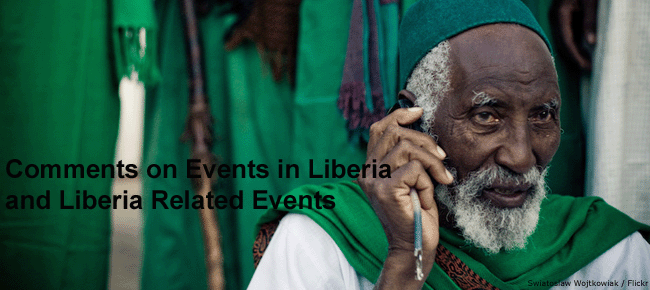Wednesday, March 24
Ritual killings. Will it ever stop?!
I was struck by a recent article: ‘Concerns of ritualistic killings: Sirleaf meets with citizens’
On March 18, more than one hundred inhabitants of Zorzor District, Lofa County, residing in Zorzor and Monrovia, staged a peaceful demonstration in the capital following a string of ritual murders in Zorzor, Lofa County, in the northwest of the country. Afterwards, President Ellen Johnson Sirleaf met with a number of them who offered her a petition. The statement was signed by paramount and clan chiefs representing clans in Bluyeama, Gizima, and Zieama. In their petition they expressed concern that the Government’s response to the recent incidents and fighting in Lofa County was overshadowing their concerns of ritualistic killings in the county.
In February, four people had been killed in Konia, Zorzor and Voinjama, the county capital in what some people say was a conflict between Christians and Muslims while others argue it was an escalated dispute over land. Much has been said and written about this. However, the representatives of Zorzor District who met with President Sirleaf were more worried about an age-old problem everybody knows and fears in Liberia. They spoke of three recent cases of ritualistic murders which have remained unsolved.
When reading the article, I almost could not believe my eyes. Nevertheless, I have no reason not to believe it. Ritual killings are - I dare to say - common in Liberia. Ritual murders are a form of juju, as sorcery is called in Liberia and a number of other West African countries. In Liberia, everybody is afraid of ‘heart men’. Centuries old traditional practices included ritual human sacrifice and sometimes even cannibalism. But from traditional practice it has turned into an important part of the political culture. Nowadays, ritual murders are also committed by ‘ordinary’ criminals who act on behalf of politicians and businessmen who want more power and wealth.
The list of victims is long and from everywhere: the southeast - Maryland County is notoriously known for it - the north, Nimba County, and as the people from Zorzor demonstrated, the northwest of the country, but also in the nation’s capital ritual murders occur. Many people live in constant fear. And not only in Liberia.
In Nigeria, every year, hundreds of children, men and women lose their lives to ritual murderers. Muti murders are widespread in southern Africa, notably in the Republic of South Africa. An estimated 300 people are sacrificed every year and their body parts used in Muti medicine. The recent wave of ritualistic killings of albino people in Tanzania and Burundi was – exceptionally – exposed in the international media. It was equally shocking to read about the child sacrifices in Uganda. Research which I conducted in recent years indicates that ritual murders occur all over the African continent. The victims are not only the slaughtered people, children, women, men, but also the entire population living in fear and too afraid to walk home after sunset or to leave for their farms before sunrise.
Freedom of fear is a human right. The rule of law is an obligation of the state.
Sure, an explanation for the phenomenon of ritual murders is the uneducated people’s belief in sorcery, but superstition alone does not explain the continuation of these barbaric and criminal acts. Moreover, the reality is that many ritualistic killings are committed by educated people. Many people in Sub-Saharan African countries believe that governments are not willing to stop and eradicate these practices since they are part of the system.
The only way these governments can prove their citizens to be wrong is to make an end to ritual murders and to give the citizens their freedom back.
2010/03/24
Subscribe to:
Posts (Atom)

